

Sufism. Sufism (or taṣawwuf; Arabic: الصوفية) is a branch of Islam,[1] defined by adherents as the inner, mystical dimension of Islam; others contend that it is a perennial philosophy of existence that pre-dates religion, the expression of which flowered within Islam.[2] Its essence has also been expressed via other religions and metareligious phenomena.[3][4][5] A practitioner of this tradition is generally known as a ṣūfī (صُوفِيّ).
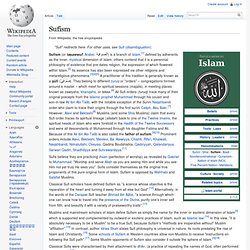
Sufis believe they are practicing ihsan (perfection of worship) as revealed by Gabriel to Muhammad: "Worship and serve Allah as you are seeing Him and while you see Him not yet truly He sees you". Sufis consider themselves as the original true proponents of this pure original form of Islam. Sufism is opposed by Wahhabi and Salafist Muslims. Classical Sufis were characterised by their attachment to dhikr, (a practice of repeating the names of God, often performed after prayers)[19] and asceticism. Etymology[edit] Philosophyfaculty.ucsd.edu/faculty/rarneson/smarttheory2.pdf.
The life and works of Alan Watts. Spirituality. Religion. Integration isn't Everything. Skip to content NOW SERVING Psychedelic Culture Menu Search Cart Facebook-f Instagram Pinterest Twitter Substance Guides IndexTerms and Conditions | Privacy PolicyShipping and Refund PolicyContact Copyright © 2021 Reality Sandwich Reality Sandwich uses cookies to ensure you get the best experience on our website.
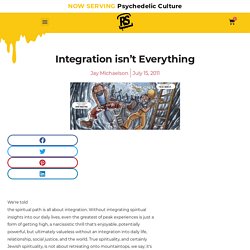
Accept. Scan0001.jpg picture by MagneticNorth03 - Photobucket. The Blog : You Do Not Choose What You Choose. From the Free Press: A belief in free will touches nearly everything that human beings value.
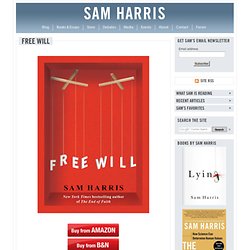
It is difficult to think about law, politics, religion, public policy, intimate relationships, morality—as well as feelings of remorse or personal achievement—without first imagining that every person is the true source of his or her thoughts and actions. And yet the facts tell us that free will is an illusion. People Argue Just to Win, Scholars Assert. Bible. Do You Believe In Free Will? Maybe You Should, Even If You Don't. Is free will real, or is just one of our happy illusions?

As it turns out, the answer might not matter as much as our belief in the answer does. A recent study showed that, when people’s belief in free will was experimentally reduced, pre-conscious motor preparation, or that activity that precedes action, in the brain was delayed by more than one second relative to those who believed in free will – an eternity in brain time. Finding free will in the brain For over fifty years, almost all the way up to his death in 2007, Benjamin Libet studied the neural correlates of consciousness. While the philosophical conclusions that have been drawn from his work remain contentious—and some would say highly problematic—he did make some fascinating discoveries about the human brain that have remained central to the study of conscious awareness.
First, he observed the existence of something called the readiness potential, or RP, in the brain, up to 550ms prior to the initiation of action. Descartes Ontological Argument. First published Mon Jun 18, 2001; substantive revision Tue Apr 12, 2011 Descartes' ontological (or a priori) argument is both one of the most fascinating and poorly understood aspects of his philosophy.
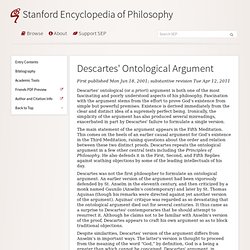
Fascination with the argument stems from the effort to prove God's existence from simple but powerful premises. Existence is derived immediately from the clear and distinct idea of a supremely perfect being. Ironically, the simplicity of the argument has also produced several misreadings, exacerbated in part by Descartes' failure to formulate a single version. The main statement of the argument appears in the Fifth Meditation. Practical Wisdom: The Right Way to Do the Right Thing. We Americans are growing increasingly disenchanted with the institutions on which we depend.
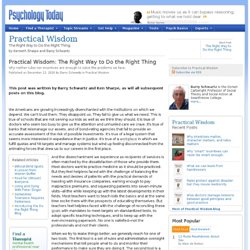
We can't trust them. They disappoint us. They fail to give us what we need. This is true of schools that are not serving our kids as well as we think they should. It is true of doctors who seem too busy to give us the attention and unhurried care we crave. Foreknowledge and Free Will Suppose it were known, by someone else, what you are going to choose to do tomorrow.
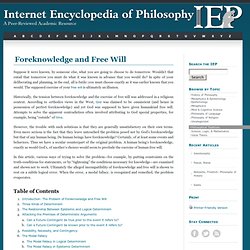
Wouldn’t that entail that tomorrow you must do what it was known in advance that you would do? In spite of your deliberating and planning, in the end, all is futile: you must choose exactly as it was earlier known that you would. The supposed exercise of your free will is ultimately an illusion. Historically, the tension between foreknowledge and the exercise of free will was addressed in a religious context.
According to orthodox views in the West, God was claimed to be omniscient (and hence in possession of perfect foreknowledge) and yet God was supposed to have given humankind free will. Ragged Trousered Philosopher. I met god the other day.

I know what you're thinking. How the hell did you know it was god? Well, I'll explain as we go along, but basically he convinced me by having all, and I do mean ALL, the answers. Are You Living in a Computer Simulation? Makes Me Think - MMT - Today's Thought-Provoking Life Stories.
The Relativity of Wrong by Isaac Asimov. By Isaac Asimov I received a letter from a reader the other day.

It was handwritten in crabbed penmanship so that it was very difficult to read. Nevertheless, I tried to make it out just in case it might prove to be important. In the first sentence, he told me he was majoring in English Literature, but felt he needed to teach me science. (I sighed a bit, for I knew very few English Lit majors who are equipped to teach me science, but I am very aware of the vast state of my ignorance and I am prepared to learn as much as I can from anyone, however low on the social scale, so I read on.) It seemed that in one of my innumerable essays, here and elsewhere, I had expressed a certain gladness at living in a century in which we finally got the basis of the Universe straight. These are all twentieth-century discoveries, you see. The young man then quoted with approval what Socrates had said on learning that the Delphic oracle had proclaimed him the wisest man in Greece. No one knows nothing.